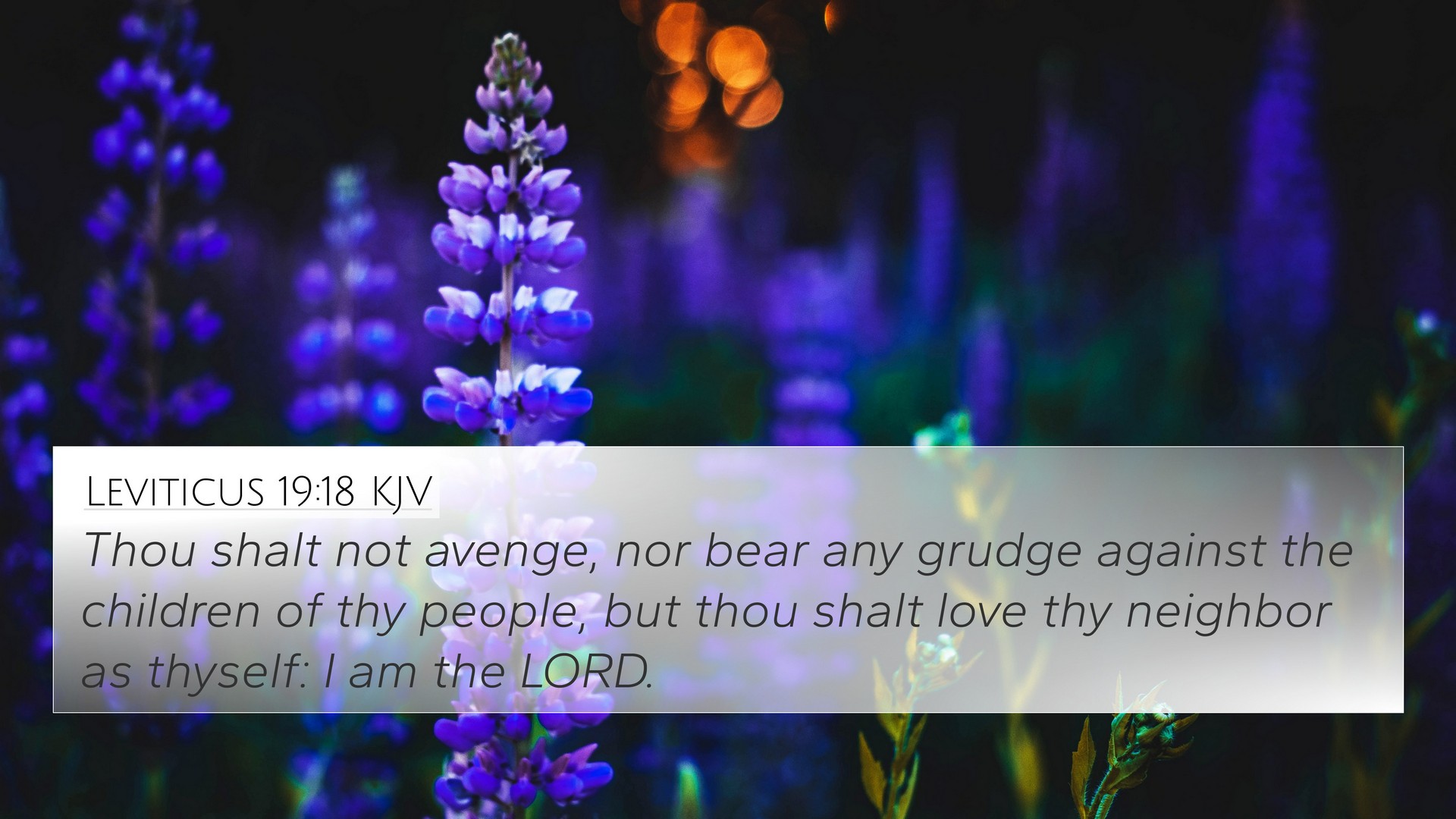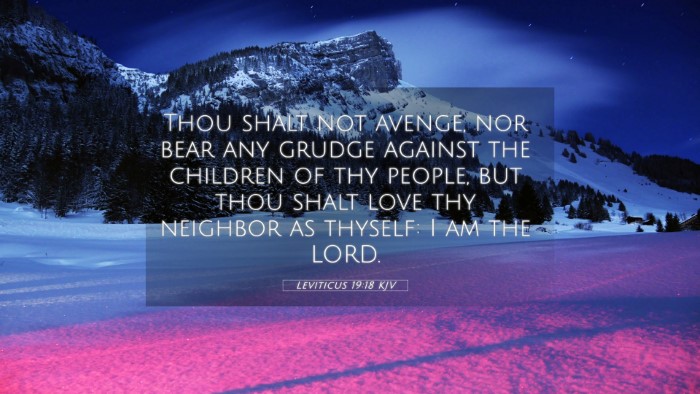This section features a detailed cross-reference designed to enrich your understanding of the Scriptures.
Below, you will find carefully selected verses that echo the themes and teachings related to Leviticus 19:18 KJV. Click on any image to explore detailed analyses of related Bible verses and uncover deeper theological insights.
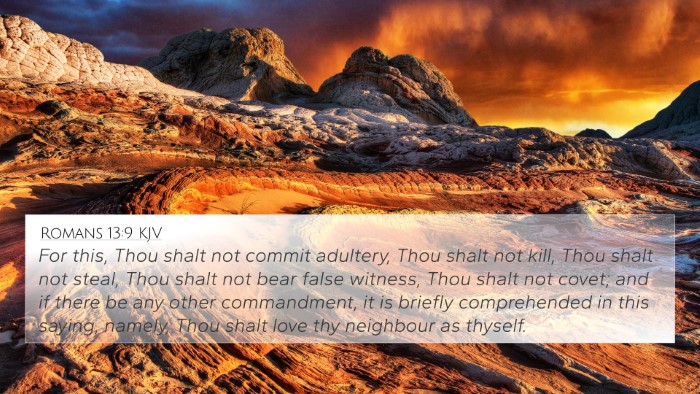 Romans 13:9 (KJV) »
Romans 13:9 (KJV) »
For this, Thou shalt not commit adultery, Thou shalt not kill, Thou shalt not steal, Thou shalt not bear false witness, Thou shalt not covet; and if there be any other commandment, it is briefly comprehended in this saying, namely, Thou shalt love thy neighbour as thyself.
 Luke 10:27 (KJV) »
Luke 10:27 (KJV) »
And he answering said, Thou shalt love the Lord thy God with all thy heart, and with all thy soul, and with all thy strength, and with all thy mind; and thy neighbour as thyself.
 Mark 12:31 (KJV) »
Mark 12:31 (KJV) »
And the second is like, namely this, Thou shalt love thy neighbour as thyself. There is none other commandment greater than these.
 Galatians 5:14 (KJV) »
Galatians 5:14 (KJV) »
For all the law is fulfilled in one word, even in this; Thou shalt love thy neighbour as thyself.
 James 2:8 (KJV) »
James 2:8 (KJV) »
If ye fulfil the royal law according to the scripture, Thou shalt love thy neighbour as thyself, ye do well:
 Matthew 5:43 (KJV) »
Matthew 5:43 (KJV) »
Ye have heard that it hath been said, Thou shalt love thy neighbour, and hate thine enemy.
 Romans 12:19 (KJV) »
Romans 12:19 (KJV) »
Dearly beloved, avenge not yourselves, but rather give place unto wrath: for it is written, Vengeance is mine; I will repay, saith the Lord.
 Exodus 23:4 (KJV) »
Exodus 23:4 (KJV) »
If thou meet thine enemy's ox or his ass going astray, thou shalt surely bring it back to him again.
 Matthew 19:16 (KJV) »
Matthew 19:16 (KJV) »
And, behold, one came and said unto him, Good Master, what good thing shall I do, that I may have eternal life?
 Romans 12:17 (KJV) »
Romans 12:17 (KJV) »
Recompense to no man evil for evil. Provide things honest in the sight of all men.
 Deuteronomy 32:25 (KJV) »
Deuteronomy 32:25 (KJV) »
The sword without, and terror within, shall destroy both the young man and the virgin, the suckling also with the man of gray hairs.
 2 Samuel 13:28 (KJV) »
2 Samuel 13:28 (KJV) »
Now Absalom had commanded his servants, saying, Mark ye now when Amnon's heart is merry with wine, and when I say unto you, Smite Amnon; then kill him, fear not: have not I commanded you? be courageous, and be valiant.
 Hebrews 10:30 (KJV) »
Hebrews 10:30 (KJV) »
For we know him that hath said, Vengeance belongeth unto me, I will recompense, saith the Lord. And again, The Lord shall judge his people.
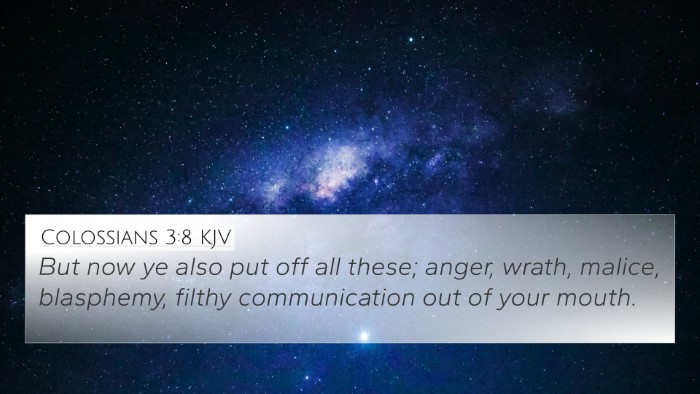 Colossians 3:8 (KJV) »
Colossians 3:8 (KJV) »
But now ye also put off all these; anger, wrath, malice, blasphemy, filthy communication out of your mouth.
 Ephesians 4:31 (KJV) »
Ephesians 4:31 (KJV) »
Let all bitterness, and wrath, and anger, and clamour, and evil speaking, be put away from you, with all malice:
 Galatians 5:20 (KJV) »
Galatians 5:20 (KJV) »
Idolatry, witchcraft, hatred, variance, emulations, wrath, strife, seditions, heresies,
 2 Samuel 13:22 (KJV) »
2 Samuel 13:22 (KJV) »
And Absalom spake unto his brother Amnon neither good nor bad: for Absalom hated Amnon, because he had forced his sister Tamar.
 Romans 13:4 (KJV) »
Romans 13:4 (KJV) »
For he is the minister of God to thee for good. But if thou do that which is evil, be afraid; for he beareth not the sword in vain: for he is the minister of God, a revenger to execute wrath upon him that doeth evil.
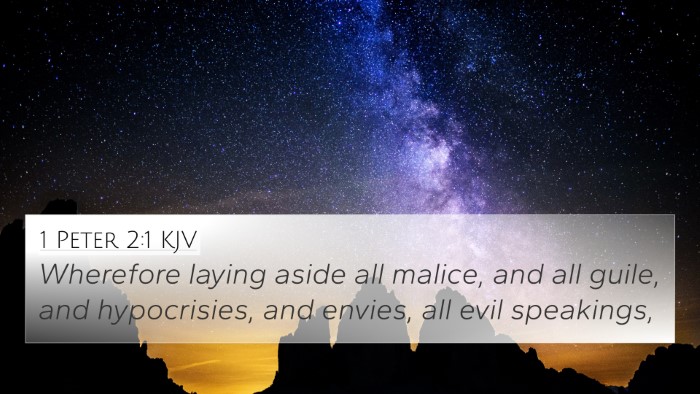 1 Peter 2:1 (KJV) »
1 Peter 2:1 (KJV) »
Wherefore laying aside all malice, and all guile, and hypocrisies, and envies, all evil speakings,
